PI木曜日レッスン2021♪
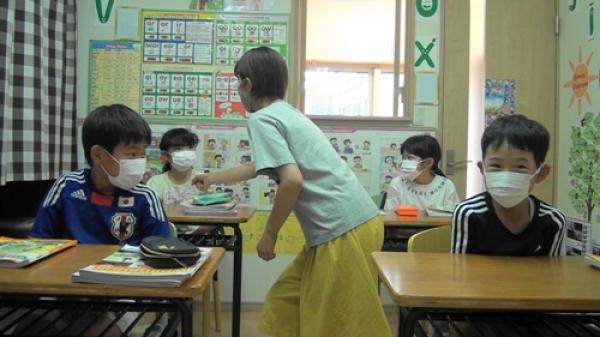
みなさまこんにちは!
夏休みに入りましたので、清水教室のレッスンの様子を紹介します。まずはPI木曜日クラスです。
PIは小学生3・4年生の経験者クラスで、木曜日は3年生4人がレッスンを受けています。感染症予防の為検温、消毒、教室の窓は開放しています。
この日のレッスンは単語テスト、簡単な文法の学習、2語のフォニックス、スピーチの発表、既習表現を使った単語の並べ替えなど盛りだくさんでした。
Hello, everyone!
I’m going to introduce the usual lessons of Shimizu Classroom because summer vacation begins.
The first is Thursday Class in PI. PI class means experienced class in the 3rd or 4th grade, four kids take lessons on Thursdays.
I always take each temperature, disinfect their hands, and I keep the window open to prevent the spread of infection.
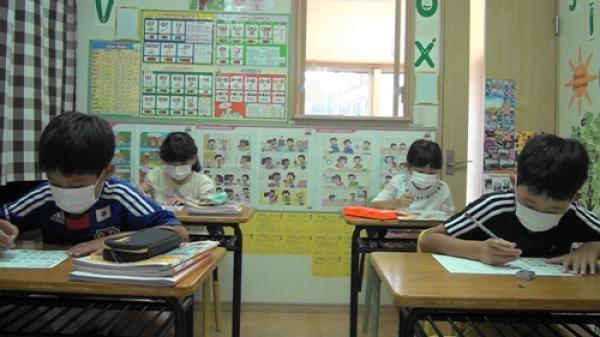
PIクラスは月に50語ほど新出単語がありますが、覚えているかどうかリスニングとリーディングテストを行います。みんな真剣に取り組んでいます!
There are about fifty new words a month to learn in PI class, we do the listening and reading test whether students remember the words or not.
They are taking on the test seriously!
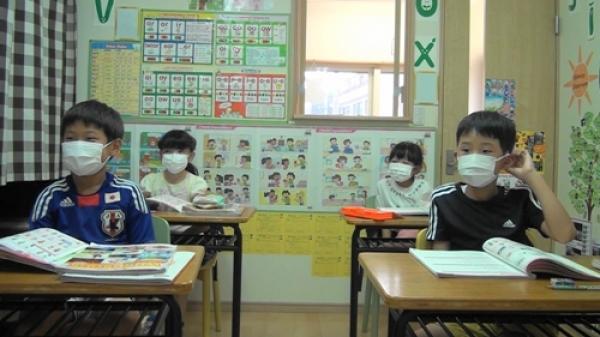
今月の文法は“I,you,he,she”を使った職業紹介でした。絵を見て相手の事を指さしていたら“You’re a firefighter.” 自分と相手以外の女の人を紹介していたら“She’s a florist.”等と口頭で文を作ります。職業がたくさん出て来たので、”「宇宙飛行士」in English?”と確認しながら進めました。
Grammar of this month was “Occupation introduction using ‘I,you,he,she’.”
If the person in the picture is pointing to the partner, we make sentence “You’re a firefighter.”
If the person is introducing the woman aside from oneself and the partner, say “She is a florist.” etc.
There were many kinds of occupations in the text, so I checked each occupation with students “How do you say 「宇宙飛行士」 in English?”
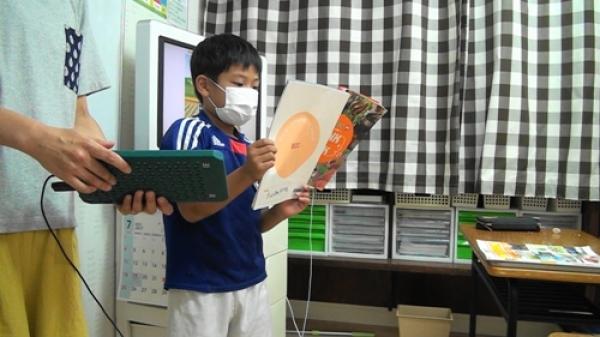
この日は月に一度の発表日。前週に果物や野菜の旬について学び、自分がもし農園を経営していたら何を育てたいかシールを3種類貼り、”Welcome to my farm.” “Apples are harvested in fall”. 等の文で農園紹介をしました。少し長めのスピーチだったので、みんな緊張していましたが、頑張っていました!
Sくんはとても堂々と発表出来ました。
This day is the presentation day of once a month. Last week, they learned about the harvest of fruits and vegetables, and this week, they put three stickers on the textbook after they thought that what would you want to grow if you were a farmer.
And then they introduce their farm using “Welcome to my farm.” “Apples are harvested in fall”.
Kids were nervous because the speech was a little long, they did their best!
S could do it confidently.
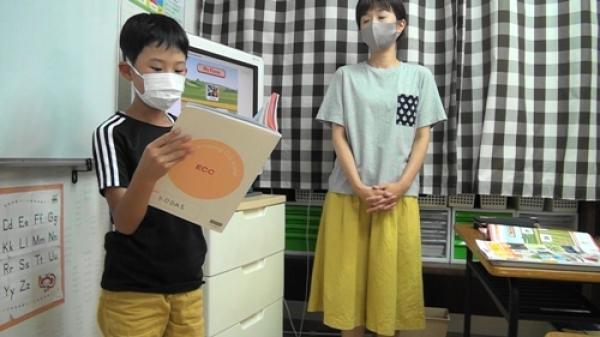
次はKくん。”Oranges are harvested in winter.”ときちんと発表出来ました。
The next is K. He could make a speech nicely like “Oranges are harvested in winter.”
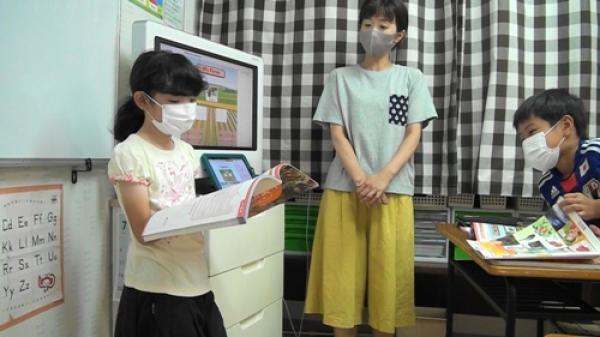
Yさんも上手に発表出来ました。
Y also could made a speech well “Strawberries are harvested in spring. My strawberries are juicy”.
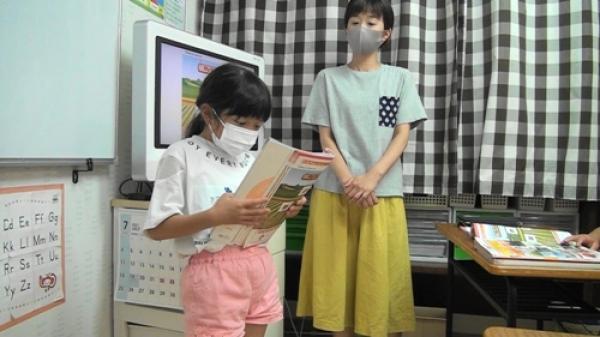
最後はぶどうが大好きなMさん。元気に発表出来ました。
The final is M, who likes grapes very much.
She made a speech “In my farm, I grow strawberries, grapes and apples. My grapes are juicy.”
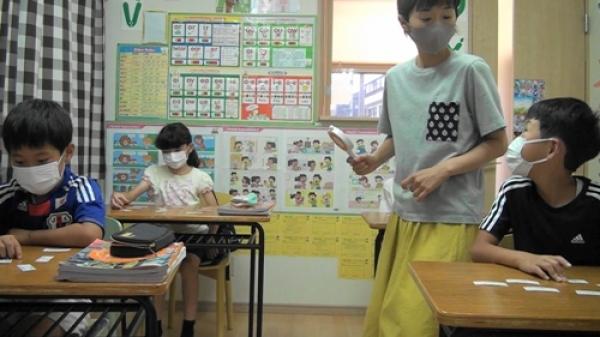
最後は、既習表現を単語カードを使って並べ替えます。英語は基本
「だれが する/です だれに なにを/どのように どこで いつ」の順番で並べます。
この日は「私はいくつか~を持っています。」「私は少しも~を持っていません」などでした。
いくつか持っている時はsome, 持っていない時はany を使うのがポイントです。
何問かは英文をゆっくり言って単語を並べていき、その後日本語を英語に訳せるかも練習します。
Lastly, kids put the words that they have learned before in order using the word cards.
Native speakers basically line up the English words like
“Who Does/Is Whom What/How Where When”
This day, “I have some hot dogs.” “I don’t have any tomatoes.” etc.
The point is using “some” when we say “have”, choosing “any” when we say “don’t have.”
I say some sentences slowly, kids try to put word cards in order, after that, they practice putting the cards translate Japanese into English.
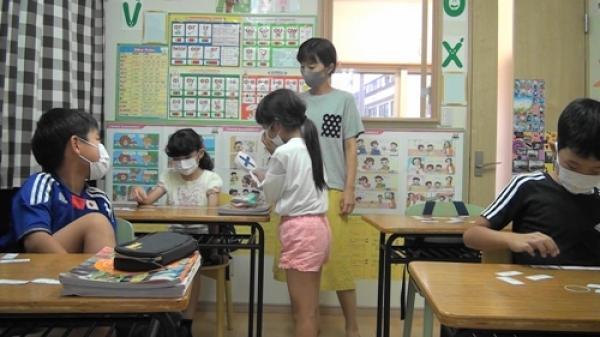
並べ終わったら”Here!”と言ってもらってチェックします。慣れてきたら、生徒に先生役をしてもらいます。
英語の語順は日本語とけっこう違うので、小学生中学年くらいからは少しずつ取り入れると、高学年になって長い文型を学習する時も役に立ちますし、英検受験の助けにもなります。
お問い合わせフォーム

